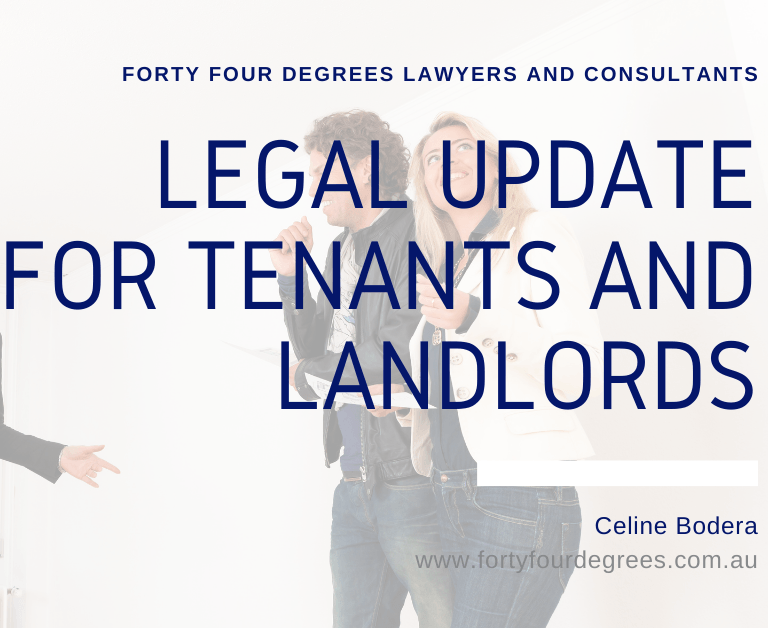Celine Bodera
Graduate Diploma of Legal Practice
Bachelor of Laws
Bachelor of Commerce (Finance)
Associate
A generalist lawyer, Celine services different clients with different needs. Family, immigration, employment - you name it!
Coincidentally, not only does Celine get told that she looks a little like Maria Sharapova, but she's no stranger to the tennis court either, having played competitively as a junior.
Celine's style on the tennis court mirrors her style in the court of law - cool, calm and collected. Celine's clients benefit from a calm and comforting experience that gives clarity to decision making at times when tensions and emotions are high.
Celine completed her Bachelor of Laws and Bachelor of Commerce with a major in Finance from Law Trobe University.

By Nicola Drakeford, Celine Bodera, and Emma Todd
•
11 Oct, 2021
The Victorian and New South Wales State Governments have recently mandated COVID-19 vaccinations for specified employers and workers. Separately, some employers such as Qantas and SPC are proactively requiring vaccinations from their staff, consistent with their obligations under section 21 of the Occupation Health and Safety Act 2004 to provide a working environment that is safe and free of risk to health. So, can your current (or potential) employer force you to get vaccinated? The short answer is no. Your employer cannot force you to get vaccinated. However, refusing to get vaccinated can have serious consequences for you and your employment – at the highest, this can include fine(s) and/or termination of your employment. When can an employer require vaccination? According to the Fair Work Ombudsman (FWO) , your employer can require you to be vaccinated in the following situations: 1. A specific law (such as Victorian State Government public health direction, which is addressed below) requires you to be vaccinated; 2. The requirement is permitted by an enterprise agreement, other registered agreement, or employment contract; 3. The direction given by your employer is lawful and reasonable (assessed on a case-by-case basis) If the employer does not require vaccinations when a specific law requires them to do so, they may be issued significant fines – see below. Specific law requiring vaccinations: Victoria’s Mandatory Vaccination Directions The Victorian Chief Health Officer can make public health directions under section 200 of the P ublic Health and Wellbeing Act 2008 . On 7 October 2021, the Victorian State Government issued Mandatory Vaccination Directions requiring mandatory vaccinations for authorised employers (called ‘providers’) and authorised workers. The Mandatory Vaccination Directions are available on the DHHS website ( (specified facilities) , ( workers ) and ( activities )) Summaries and guidance of the Mandatory Vaccination Directions are available on the coronavirus website . Broadly, the Mandatory Vaccination Directions require an authorised worker to have: • By 15 October 2021: either the first dose of a COVID vaccination, or a booking to have it before 22 October 2021; • By 22 October 2021, the first dose of a COVID vaccination; • By 24 November 2021, two doses of a COVID vaccination. There are medical exemptions, and exemptions for genuine emergencies. There are also different dates and requirements for healthcare, construction, education, and childcare industries. Who does the Mandatory Vaccination Directions apply to? Whether employers or workers are subject to the Mandatory Vaccination Directions depend on their industry. Generally, so long as someone works from home full time, they are not required to be vaccinated. A list of industries and workers which the Mandatory Vaccination Directions apply to can be found in the schedules to the Mandatory Vaccination Directions (( specified facilities ), ( workers ) and ( activities )). They are also summarised on the coronavirus website . Who can issue medical exemptions? Medical exemptions may only be issued by a limited group of medical doctors. The medical exemption may only be granted in specific circumstances, including where there is medical contraindication, or the person has an acute medical illness preventing vaccination. Can an employer require me to provide my vaccination or health information? Yes, because employers are legally required to collect, record, and store vaccination records or a medical exemption for all workers who are subject to the Mandatory Vaccination Directions. There are no privacy laws in Victoria which prevent the collection information where it is legally required. Employers should ensure the information is stored in a safe and secure location. What if I don’t comply with the Mandatory Vaccination Direction? It is a criminal offence not to comply with a public health direction. The current fines applicable are summarised at this link . At the time of this blog post, fines can start at $1,817 for individuals and up to $10,904 for corporations and, at their highest, increase to $21,808 for individuals and $109,044 for corporations through the court system. If the Mandatory Vaccination Direction applies to a worker and they refuse to comply with it, the employer may have grounds to dismiss the worker. Additionally, it is possible that if an employer does not comply with the Mandatory Vaccination Direction, they may be accused of breaching their obligation under section 21 of the Occupational Health and Safety Act 2004 to provide a working environment that is safe and free of risk to health. The maximum fine per breach is $327,132 for individuals and $1,635,660 for corporations. Lawful and reasonable directions to vaccinate Even if the Mandatory Vaccination Direction does not apply to you or your industry, employers can mandate vaccination by issuing a lawful and reasonable direction to their workers to be vaccinated. It is recommended that such directions allow for medical exemptions, if possible. Workers are required to obey the lawful and reasonable directions of an employer. Refusal to do so may give your employer a valid reason to dismiss you. Is a direction lawful and reasonable? Whether a direction is lawful and reasonable will be assessed on a case-by-case basis. There are numerous factors to consider, which can include: (a) The industry of the employer, and the inherent risks of the industry, such as if there is a heightened risk of contracting COVID-19 or suffering severe symptoms of COVID-19 based on the type of workplace and the people in that workplace; (b) The vulnerability of the clients of the employer; (c) The vulnerability of the workers; (d) Whether alternative measures can adequately protect workers and/or clients; (e) The medical opinion or health regulations followed by the employer (such as the Mandatory Vaccination Direction, above); (f) The reason the worker has provided for refusing to be vaccinated, and any supporting documents provided; (g) The reasonableness of the medical exemptions allowed; (h) The rate of community transmission in the area where the workplace and the worker are located. There are no judgments on challenges to mandatory COVID-19 vaccinations yet. However, in the cases of Arnold v Goodstart Early Learning Limited TA Goodstart Early Learning [2020] FWC 6083 and Glover v Ozcare [2021] FWC 2989, the Fair Work Commission held that the requirement to receive a flu vaccination can constitute a “lawful and reasonable” direction. In addition to the factors at (a) to (h) above, the Fair Work Ombudsman’s four-tier system can operate as a guide on the “reasonableness” of a direction. The higher the tier, the more likely that a direction will be assessed as being reasonable: Tier 1: Workers are required as part of their duties to interest with an increased risk of being infected with COVID-19 (for example, hotel quarantine or border control workers or people who work directly with COVID positive people) Tier 2: Workers are required to have close contact with people who are particularly vulnerable to the health impacts of coronavirus (for example, health care or aged care workers) Tier 3: Where a worker interacts or will likely interact with people, such as colleagues, customers or the public, in the normal course of employment (for example, store workers providing essential goods and services) Tier 4: Employees that have minimal face-to-face interaction as part of their normal employment duties (for example, employees that work from home). A note on discrimination Generally, a mandatory vaccination policy that allows for reasonable medical exemptions will not be discriminatory under Victorian or federal discrimination laws. There are both federal and Victorian laws protecting workers from discrimination. These include the E qual Opportunity Act 2010 , the Fair Work Act 2009 , the Age Discrimination Act 2004 , the Disability Discrimination Act 1992 , and the Sex Discrimination Act 1984 . Your current or potential employer is prohibited by law from discriminating against you based on the protected attributes including race, sex, sexual orientation, age, physical or mental disability, family or carer's responsibilities, pregnancy and religion. Vaccination status, or beliefs about vaccination, are not protected attributes. There is little evidence to suggest a vaccination mandate could be religious discrimination, given that the leaders of all major religions have supported COVID-19 vaccinations. If a mandatory vaccination policy did not allow for medical exemptions for people whose disability prevented them from being vaccinated, this may amount to discrimination if there is no reasonable basis for not allowing medical exemptions. Further advice COVID-19 laws and policies are constantly evolving. Whether you are an employer or a worker, it is recommended that you obtain legal advice to help you navigate this complex landscape. Forty Four Degrees can assist you in navigating all aspects of mandatory vaccinations. You may consider obtaining legal advice on: • whether the Mandatory Vaccination Directions apply to you and/or your staff; • whether requiring vaccinations would amount to a lawful and reasonable direction for your specific workplace; • which medical or emergency exemptions may apply to your workplace or your specific circumstances. For further advice, please contact: Nicola Drakeford | Partner | [email protected] Celine Bodera | Lawyer | [email protected]

By Celine Bodera
•
17 Aug, 2021
A court or tribunal has made an order for someone to pay you money (known as a “judgment debt”) but that someone fails, neglects, or refuses to do so. What now? There are several options for enforcing a judgment debt. One option is to make the debtor bankrupt. Why bankruptcy? When a person is declared bankrupt, a trustee will be appointed to manage the bankruptcy. This involves liquidating any assets available to pay debts owing to creditors. A person with a judgment debt in their favour is a creditor whose debt is “provable” in bankruptcy. This means that, if the debtor is made bankrupt, the judgment creditor is in line to receive proceeds from the assets of the bankrupt debtor. How do I make my debtor bankrupt? The main steps involved are as follows: Issue a Bankruptcy Notice Lodge a Creditor’s Petition An application for a Bankruptcy Notice is made to the Australian Financial Security Authority. A Creditor’s Petition is lodged with the Federal Court of Australia. What is a Bankruptcy Notice? A Bankruptcy Notice is a formal demand for payment of a judgment debt of at least the statutory minimum (currently $10,000) that is less than six years old. A Bankruptcy Notice will give the debtor 21 days to do one of the following: Comply with the demand; Apply for more time to comply with the demand; Apply to set aside (or “cancel”) the demand; or Do nothing. Complying with the demand means paying the debt. Applying to set aside the demand means challenging the demand. Doing nothing constitutes an “act of bankruptcy” pursuant to section 40 of the Bankruptcy Act 1966 (Cth) ( Bankruptcy Act ), which allows the creditor who issued the demand to lodge a Creditor’s Petition. Setting aside a Bankruptcy Notice A Bankruptcy Notice can be set aside on several grounds, including the following: The debt being claimed does not exist; There is a defect in the notice, which causes substantial injustice or confusion; or The debtor has a counter claim, set-off or cross demand equal to or exceeding the amount of the debt being claimed. What is a Creditor’s Petition? A Creditor’s Petition is a petition for the court to make a sequestration order against a debtor. A Creditors’ Petition must be lodged within six months of the act of bankruptcy. A sequestration order is what declares a debtor bankrupt and allows a trustee to be appointed to manage the debtor’s assets. It is important for the petitioning creditor to seek a sequestration order that provides for priority of the creditor’s costs. This means that the creditor’s costs incurred in connection with the petition will be given priority over other debts when the proceeds of the assets of the bankrupt debtor are distributed amongst creditors. If you want to enforce a judgment debt, or if you have been served with a Bankruptcy Notice, give us a call to find out where you stand. Celine Bodera is a lawyer at Forty Four Degrees and has a generalist practice. She works in areas of family law, commercial litigation, property, wills and estates.

By Jamielle Mckinnon and Celine Bodera
•
09 Aug, 2021
There is often confusion around insolvent deceased estates and what needs to be done to handle their affairs. This article explores the concepts of insolvency and bankruptcy in the context of deceased estates and summarises the key legislative provisions that apply. Insolvency vs bankruptcy Whilst the terms insolvency and bankruptcy are often used interchangeably, they have distinct meanings. Insolvency refers to situations where a debtor cannot pay their debts on time whereas bankruptcy refers to a legal process where an insolvent debtor is legally declared unable to pay their debts. Insolvency can, therefore, lead to bankruptcy. When a debtor becomes bankrupt, a trustee is appointed to administer the estate of the debtor. This involves realising the assets of the estate (generally by way of liquidation) for distribution amongst creditors. Deceased estates Executors or administers of a deceased estate are tasks with administering the deceased estate. This involves paying the liabilities of the estate and distributing any remaining assets of the estate in accordance with a will or the rules of intestacy (if there is no will). If an individual becomes insolvent on or around the time of their death, or their deceased estate subsequently becomes insolvent, the executor/administrator, or a creditor who is owed a debt by the deceased, can initiate bankruptcy proceedings. Legislative provisions to note Under section 244 of the Bankruptcy Act 1966 (Cth) (Bankruptcy Act), creditors can apply to bankrupt a deceased estate if a debt of not less than the statutory minimum: Was owed by the deceased at the time of their death; Is incurred by the legal personal representative of the deceased (executor/administrator of the estate); or Would have been owed by the deceased had they not died. In 2020, due to the economic impact of the COVID-19 pandemic, the statutory minimum was increased from $5,000 to $20,000. Following changes implemented on 1 January 2021, the statutory minimum was lowered to $10,000. Where two or more creditors wish to apply to bankrupt a deceased estate jointly, the statutory minimum is $10,000 in the aggregate. Under section 247 of the Bankruptcy Act, the executor/administrator of a deceased estate can apply to bankrupt an insolvent deceased estate (known as voluntary bankruptcy). To do so, at least one of the following conditions must be met: The deceased person, at the time of their death, was personally present or ordinarily resident in Australia; Had a dwelling house or place of business in Australia; Was carrying on business in Australia, either personally or by means of an agent or manager; or Was a member of a firm or partnership carrying on business in Australia by means of a partner or partners, or of an agent or manager. Under section 39 of the Probate Act 1958 (Vic) (Probate Act) , an insolvent deceased estate that is not being administered under the Bankruptcy Act (i.e. is not declared bankrupt) must nonetheless be carried out in accordance with the “bankruptcy rules” under the Bankruptcy Act. However, administering a deceased estate under the Bankruptcy Act may be preferred as it can allow creditors access to certain assets that would otherwise not be accessible. If you need legal advice in relation to the administration of an insolvent deceased estate, give us a call. If you have not read part 1 or 2 of our series on Will Dispute guides, then please read our Wills & Estates FAQ and Probates – A Guide for Executors FAQ Celine Bodera is a lawyer at Forty Four Degrees and has a generalist practice. She works in areas of family law, property, wills and estates.

By Celine Bodera
•
05 Apr, 2021
On 29 March 2021, new rental laws came into effect in Victoria. If you are a renter (formerly called “tenant”) or a rental provider (formally called “landlord”), it is important that you become familiar with the new laws and how they impact your rights and responsibilities. The changes to the rental rules are sweeping (130 in total) and include: An expanded definition for “urgent repairs” The introduction of “minimum standards” for rental properties A new process for repeated late or non-payment of rent The requirement for a valid reason to end a rental agreement Renters can make some modifications to the rental property Is it urgent? Rental rules distinguish between “urgent repairs” and “non-urgent repairs”. Urgent repairs must be made within 24 to 48 hours of the renter requesting the repairs whereas non-urgent repairs must be made within 14 days of the renter requesting the repairs. The definition for “urgent repairs” has widened to include repairs (or replacements) to broken air conditioning, broken safety devices and faults that make the rental property unsafe or insecure. If a rental provider does not immediately respond to a renter’s request for urgent repairs, the renter may undertake repairs worth up to $2,500 and be entitled to receive a reimbursement from the rental provider. Importantly, it remains the case that renters must continue to pay rent in accordance with the rental agreement while they are waiting for repairs to be made. If a renter wants to withhold rent from the rental provider until repairs are made, the renter can apply to VCAT for their rent to be temporarily paid into a special account held by VCAT. Rental “minimum standards” Rental properties must now meet minimum standards with respect to the following 14 categories: locks, bins, toilets, bathrooms, kitchens, laundries, structural soundness, mould and damp, Electricity safety, window coverings, windows, lighting, ventilation and heating. If a rental property fails to meet the minimum standards, renters can end the rental agreement before moving in without incurring a penalty or move in and request “urgent repairs” to bring the rental property up to minimum standard. 5 strikes and they’re out* Late or non-payment of rent entitles a rental provider to issue the renter with a notice to vacate the rental property within 14 days. Each notice to vacate issued to a renter counts as one “strike”. To avoid being evicted, a renter can pay unpaid or overdue rent within the notice period. However, this option to invalidate a notice to vacate can be exhausted. A renter can only invalidate up to 4 notices to vacate issued to them in a 12-month period. This means that, when after five “strikes”, a rental provider can apply to VCAT for a possession order regardless of whether the renter pays their unpaid or overdue rent within the notice period. A possession order enables a rental provider to purchase a warrant to forcibly evict a renter. *A renter may not be evicted if the eviction would be unreasonable and disproportionate. No reason to go is a reason to stay Previously, the law permitted “no-grounds evictions”. This meant that rental providers could issue notices to vacate without any reason. This is no longer the case. Rental providers must now provide a “valid” reason to issue a notice to vacate to a renter during, or at the end, of a rental agreement. The law provides an exhaustive list of reasons that are considered “valid”, including: When the renter or their visitor intentionally or recklessly causes serious damage to the property, including safety equipment and common areas When the renter owes at least 14 days rent When the renter has failed to comply with a VCAT compliance order When the renter has brought in other renters or sub-letters without consent The amount of notice to be provided will depend on the reason given for the notice. The notice period can vary from immediate notice to 28 days’ notice. Make your house a home Renters can make some simple non-permanent modifications to their rental property without needing to obtain consent from the rental provider. Where consent is needed for a non-permanent modification, it cannot be unreasonably refused. Some of the modifications that can be made without consent are: Picture hooks or screws for wall mounts, shelves or brackets in walls, provided the devices do not penetrate walls that are exposed brick or concrete Non-permanent window film for privacy or insulation Security light, alarm system or security camera that can easily be removed, is not hard wired and does not impact on the privacy of neighbours If the modification is needed for health, safety or security, then a refusal to consent to the modification may be unreasonable. For more information on the changes to rental laws in Victoria, access the Consumer Affairs Victoria website at this link . To read the Residential Tenancies Act 1997 (Vic), click here . For legal advice, give us a call. Celine Bodera is a lawyer at Forty Four Degrees and has a generalist practice. She works in areas of family law, property, wills and estates.
Contact Us
We’re an Australian Law Firm promoting a nuanced, personal touch. We have the skills you need to resolve your case quickly and with a positive outcome. Our straight talking team stays close to simplify what is most often a complicated process. We help individuals and businesses with technology and startup law, property law including conveyancing and leasing, commercial law, civil litigation, wills, estates, bankruptcy, insolvency, criminal law, and professionals facing investigations and charges from their regulatory body.
We have a connected network of talented lawyers in Melbourne CBD, Dandenong, Ballarat, and Ivanhoe East.
Fill out the form or call us on 1300 892 237.
Thank you for contacting us.
We will get back to you as soon as possible
We will get back to you as soon as possible
Oops, there was an error sending your message.
Please try again later or call us on 1300 892 237.
About Us
We do business your way.
203/ 50 Market St, Melbourne VIC 3000
50 Lydiard St South
Ballarat Central VIC 3350


